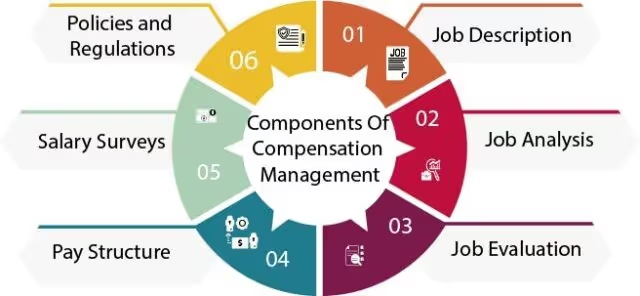Compensation Management in a Remote Work World: Best Practices for Success

Remote work refers to the increasing trend of employees working outside of traditional office settings, such as from their homes or co-working spaces. This trend has been driven by advances in technology that allow for remote communication and collaboration, as well as changing attitudes toward work-life balance and the desire for greater flexibility.
The COVID-19 pandemic has also accelerated the shift toward remote work, as many businesses have had to adapt to social distancing guidelines and remote work has become a necessity for many. While remote work can offer benefits such as increased flexibility and cost savings for businesses, it can also pose challenges such as communication difficulties and reduced opportunities for social interaction.
The Importance Of Effective Compensation Management In A Remote Work World
Effective compensation management is critical in a remote work world to attract and retain talented employees and maintain a competitive edge. In a remote work environment, it is important to ensure that compensation and benefits packages are designed to meet the unique needs and expectations of remote employees.

Remote work can come with unique expenses, such as home office equipment and internet connectivity, and compensation packages need to take these costs into account. Companies also need to ensure that remote employees receive the same benefits as their office-based counterparts, including health insurance, retirement benefits, and paid time off.
Key Challenges of Managing
Managing compensation in a remote work world presents unique challenges that must be addressed to ensure fair and effective compensation practices. Some of the key challenges include:
Lack of In-Person Interaction
One of the key challenges of remote work is the lack of in-person interaction, which can have implications for compensation management. When employees are not physically present in the same location, it can be more difficult to build relationships and establish a sense of camaraderie among team members. This can lead to feelings of isolation and disconnection from the company, which can impact employee morale and engagement.
From a compensation management perspective, the lack of in-person interaction can also make it difficult to evaluate performance and determine appropriate compensation levels. In a remote work environment, it can be more difficult to observe employee behavior and assess their contributions to the company. This can make it challenging to determine whether an employee is meeting their performance goals and whether they deserve a raise or promotion.
To address these challenges, companies can take steps to foster a sense of community and connection among remote employees.
This can include regular video conference meetings, virtual team building activities, and opportunities for employees to socialize and connect on a personal level. It is also important to establish clear performance metrics and goals that are aligned with the company's overall objectives and to provide regular feedback and coaching to employees.
Difficulty in Assessing Performance
Another key challenge of managing compensation in a remote work world is the difficulty in assessing performance. In a traditional office setting, managers can observe employees' work habits and productivity, providing a basis for evaluating their performance. However, in a remote work environment, managers may have limited visibility into employees' work habits and productivity, making it more challenging to evaluate performance.
To address this challenge, companies can establish clear performance metrics and goals that are aligned with the company's overall objectives. This can include setting specific targets for productivity, quality, customer satisfaction, and other key performance indicators (KPIs). Companies can also use technology to monitor employee performance, such as tracking employee work hours and the completion of tasks.
It is also important for companies to establish regular communication and feedback mechanisms to ensure that remote employees receive ongoing support and coaching.
Ensuring Fairness and Consistency
Ensuring fairness and consistency in compensation management is critical in a remote work world, where employees may be located in different parts of the world and have different levels of experience and qualifications. Failure to ensure fairness and consistency can lead to low employee morale, decreased productivity, and higher turnover rates.

To address this challenge, companies can establish clear compensation policies and guidelines that are consistently applied to all employees, regardless of their location or level of experience. This can include setting minimum and maximum compensation levels for different roles and providing clear guidelines for how compensation is determined.
Best Practices for Managing Compensation in a Remote Work World
Managing compensation in a remote work world is important to ensure that employees are fairly compensated and motivated to perform at their best. Remote work presents unique challenges for compensation management, such as setting fair and consistent compensation, evaluating performance, and ensuring compliance with local laws and regulations.
If compensation is not managed effectively, it can lead to low employee morale, decreased productivity, and higher turnover rates. In a remote work environment, where employees may feel isolated and disconnected from the company, it is important to ensure that compensation practices are transparent, consistent, and aligned with the company's overall objectives.
Effective compensation management can also help companies attract and retain top talent in a competitive job market. By offering competitive compensation packages and providing ongoing support and coaching, companies can demonstrate their commitment to their employees' success and well-being, and create a positive and productive work environment.
Utilizing Technology to Streamline Processes
Utilizing technology to streamline processes is an effective way to improve compensation management in a remote work world. Here are some ways that technology can be leveraged to streamline compensation processes:
- Automation: Companies can use automation to reduce the time and effort required to manage compensation processes. For example, they can use automated tools to calculate salaries, bonuses, and other compensation elements based on predefined rules and criteria. This can save time and reduce errors, and can also help ensure that compensation is consistent and aligned with company policies and guidelines.
- Cloud-based tools: Cloud-based tools can provide a centralized platform for managing compensation data and processes. This can help ensure that compensation data is up-to-date, accessible to relevant stakeholders, and securely stored. Cloud-based tools can also provide real-time insights into compensation trends and help identify areas for improvement.
- Analytics and data visualization: Companies can use analytics and data visualization tools to gain insights into compensation trends and patterns. This can help identify areas where compensation practices may need to be adjusted to ensure fairness and consistency. Analytics and data visualization tools can also help identify top performers and provide insights into how to better motivate and retain them.
- Collaboration tools: Collaboration tools can help remote employees work together effectively on compensation-related tasks. For example, teams can use video conferencing and file-sharing tools to review and discuss compensation data and make decisions collaboratively. This can help ensure that all stakeholders have a clear understanding of compensation decisions and that decisions are made fairly and transparently.
Setting Clear Expectations and Goals
Setting clear expectations and goals is critical for effective compensation management in a remote work world. When employees are working remotely, it can be more challenging for managers to evaluate performance and determine appropriate compensation levels. By setting clear expectations and goals, managers can establish a framework for evaluating employee performance and determining compensation.

Here are some best practices for setting clear expectations and goals:
- Establish performance metrics: Companies should establish clear performance metrics that align with their overall objectives. These metrics should be measurable, objective, and communicated to employees in advance.
- Define job responsibilities: Managers should provide clear job descriptions that outline the specific responsibilities and expectations for each role. This can help employees understand what is expected of them and how their performance will be evaluated.
- Provide regular feedback: Managers should provide regular feedback to employees on their performance, both positive and constructive. This can help employees understand how they are performing against expectations and what areas they need to improve on.
- Establish a performance review process: Companies should establish a formal performance review process that is conducted regularly (e.g. annually, bi-annually). This can provide an opportunity for managers and employees to review performance, set new goals, and discuss compensation.
- Use technology to track performance: Companies can use technology to track employee performance and provide real-time feedback. For example, project management software can help managers monitor employee progress and provide feedback on specific tasks.
Creating Fair and Consistent Compensation Plans
Creating fair and consistent compensation plans is essential in a remote work world, where employees may be located in different parts of the world and have different levels of experience and qualifications. To create fair and consistent compensation plans, companies should establish clear compensation policies and guidelines that are consistently applied to all employees.
This can include setting minimum and maximum compensation levels for different roles and providing clear guidelines for how compensation is determined. Companies can also conduct regular market research to ensure that their compensation packages are competitive and aligned with industry standards, and use objective performance metrics to determine compensation levels.
Finally, companies should provide regular feedback and coaching to employees to help them understand how their compensation is determined and how they can improve their performance to achieve higher compensation levels.
Providing Regular Feedback and Communication
Providing regular feedback and communication is essential for effective compensation management in a remote work world. Remote employees may feel isolated and disconnected from the company, and may require more frequent communication and feedback to feel engaged and motivated.
Here are some best practices for providing regular feedback and communication:
- Schedule regular check-ins: Managers should schedule regular check-ins with remote employees to discuss their progress, provide feedback, and address any concerns or challenges. This can help keep employees engaged and motivated, and can also provide an opportunity to discuss compensation.
- Use video conferencing: Video conferencing can provide a more personal and engaging way to communicate with remote employees. Managers should use video conferencing for regular check-ins and team meetings to help build a sense of community and connection among remote employees.
- Provide timely and constructive feedback: Managers should provide timely and constructive feedback to employees on their performance, both positive and negative. This can help employees understand how they are performing against expectations and what areas they need to improve on.
- Foster open communication: Managers should foster open communication with employees and encourage them to share their feedback, ideas, and concerns. This can help build trust and collaboration among remote employees and can also help identify areas for improvement in compensation management.
Case Study of Compport Success in remote world
Case Study 1: Streamlining Compensation Management for a Global Remote Workforce
Company Background:
PWC India., a rapidly growing tech company, has embraced remote work and now employs a diverse and geographically dispersed team of over 30,000 employees.
Challenge:
As PWC Inc. expanded, managing employee compensation across different countries, currencies, and regulatory environments became increasingly complex. The company needed a comprehensive compensation management solution that would simplify the process, ensure compliance, and allow for customization based on regional variations.
Solution:
PWC India. turned to Compport, a leading compensation management software, to streamline its compensation processes. Compport's features, including multi-currency support, global market data integration, and compliance management, enabled PWC India. to create a tailored compensation strategy for its remote workforce.
Results
- Simplified compensation management across different countries and currencies
- Improved compliance with local regulations and tax requirements
- Increased transparency and employee satisfaction through clear communication of compensation plans
- Enhanced ability to attract and retain top talent globally
Case Study 2: Adapting Compensation Strategies to a Remote Workforce during the COVID-19 Pandemic
Company Background:
Indegene Ltd., a mid-sized professional services firm, traditionally operated with an office-based workforce. Due to the COVID-19 pandemic, the company shifted to remote work and faced new challenges in managing employee compensation.
Challenge:
As the pandemic changed the economic landscape, Indegen needed to adapt its compensation strategy to remain competitive, retain talent, and support remote work. The company required a flexible compensation management tool that could accommodate changes in market conditions, employee needs, and company priorities.
Solution:
Indegen implemented Compport, a leading compensation management software, to help develop and manage a revised compensation strategy that addressed the unique challenges of remote work. Compport's features, such as performance-based incentives, market data integration, and flexible benefits management, allowed Indegen Ltd. to create a tailored and adaptable compensation plan.
Results
- Quick adaptation of compensation strategy to address pandemic-related challenges
- Improved employee engagement and satisfaction through customized remote work benefits
- Enhanced performance management through the integration of performance-based incentives
- Increased agility in responding to changes in market conditions
Navigating the New Normal in Remote First World
Navigating the new normal of remote work compensation management requires companies to adapt to the unique challenges of managing compensation in a distributed workforce. Here are some key considerations for navigating this new normal:
- Establish clear compensation policies and guidelines: Companies should establish clear compensation policies and guidelines that are consistently applied to all employees, regardless of their location or role. This can help ensure that compensation is fair and consistent across the entire company.
- Use technology to streamline compensation processes: Companies can use technology to streamline compensation processes, such as salary benchmarking, bonus and equity management, and total rewards statements. This can help ensure that compensation is aligned with market rates and industry standards.
- Provide regular feedback and communication: Managers should provide regular feedback and communication to remote employees on their performance and compensation. This can help build trust and engagement among remote employees and ensure that they feel connected to the company.
- Foster a culture of transparency: Companies should foster a culture of transparency around compensation, including sharing salary ranges and compensation data with employees. This can help build trust and transparency among employees and ensure that compensation is aligned with company values.
- Be flexible and adaptable: Companies should be flexible and adaptable in their compensation strategies, as the needs and expectations of remote employees may differ from those in a traditional office environment. This can include offering flexible work arrangements, providing additional benefits or incentives, and adjusting compensation levels based on market conditions.
Overall, navigating the new normal of remote work compensation management requires companies to be flexible, adaptable, and responsive to the needs of remote employees. By establishing clear policies and guidelines, using technology to streamline processes, providing regular feedback and communication, fostering transparency, and being flexible and adaptable, companies can create a compensation framework that supports employee engagement, motivation, and success.
Future Outlook For Compensation Management In A Remote Work World
The future outlook for compensation management in a remote work world is likely to be shaped by several key trends and developments. Here are some potential factors that may influence the future of compensation management:

- Increasing use of data and analytics: The use of data and analytics is likely to become more prevalent in compensation management, as companies seek to better understand market rates and industry trends, and use data to make more informed decisions about compensation.
- Greater focus on employee well-being: The COVID-19 pandemic has brought issues of employee well-being and work-life balance to the forefront, and companies may place a greater emphasis on compensating employees in ways that promote well-being, such as offering flexible work arrangements, additional benefits, and incentives.
- Greater emphasis on transparency: Companies may place a greater emphasis on transparency in compensation, as employees increasingly expect to understand how their compensation is determined and how it compares to market rates.
- Continued reliance on technology: The use of technology in compensation management is likely to continue to grow, as companies seek to streamline processes and increase efficiency in a remote work world.
- Shift toward outcomes-based compensation: As the nature of work continues to evolve, companies may shift toward outcomes-based compensation models that reward employees for achieving specific goals or outcomes, rather than focusing solely on traditional metrics such as time worked or hours billed.
Conclusion
The future of compensation management in a remote work world is likely to be shaped by a range of trends and developments, including the increasing use of data and analytics, a greater focus on employee well-being, a greater emphasis on transparency, continued reliance on technology, and a shift toward outcomes-based compensation models.
Find out how Compport can help you manage all your remote Compensation Management process, book a demo today!
%2520(6)%2520(2).avif)
Frequently Asked Questions
Q1: How has the shift to remote work affected compensation management?
A: The shift to remote work has made compensation management a more complex process. With employees working from different locations, companies need to consider variables like living costs and local market rates. In addition, remote work has made roles more results-focused rather than time-focused, which has led to a need for more flexible and performance-based compensation models.
Q2: What are some best practices for managing compensation in a remote work environment?
A: Best practices include transparent communication about pay scales, providing equitable pay for equivalent work, taking into account geographical differences, considering the cost of living adjustments, and exploring performance-based compensation. Implementing a robust and flexible benefits package that includes items like remote work allowances for home office setup and utilities can also be part of a well-rounded compensation strategy.
Q3: How can organizations ensure pay equity in a remote work environment?
A: Pay equity can be achieved by setting clear and consistent compensation policies that consider factors such as the role's responsibilities, the employee's experience and qualifications, and the market rate for the role in the employee's location. Regular audits and reviews can also help ensure that these policies are being followed and that any disparities are addressed promptly.
Q4: How does compensation management in remote work influence employee engagement and retention?
A: Compensation management in a remote work environment plays a crucial role in employee engagement and retention. Adequate and fair compensation, inclusive of location-based adjustments and benefits, can boost employee morale, satisfaction, and productivity. Transparent compensation policies can also promote trust and loyalty among employees, reducing turnover and fostering long-term commitment.
Q5: What challenges do organizations face in implementing compensation management in a remote work world, and how can they be overcome?
A: Challenges include maintaining pay equity, considering cost of living differences, and managing employees' expectations. To overcome these challenges, organizations can implement clear compensation policies, regularly review their compensation practices, and invest in compensation management tools. Frequent and transparent communication with employees about compensation issues can also help manage expectations and foster trust.


%20(49).png)
%20(48).png)
%20(47).avif)
